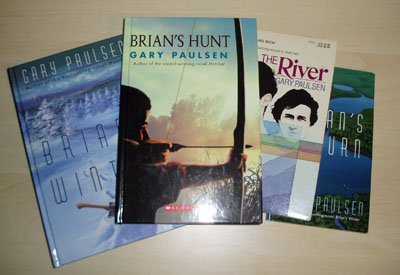
*Hatchet*
A few months ago, I had a conversation with a co-worker about reading. She told me that she didn't really like a lot of the fiction she read, but still felt like she probably should be reading something. My wife is a middle school teacher and we have a lot of adolescent literature around the house (read - 12-15 y/o age range). Many of these books cover serious topics, but are written in less complicated way that is easy for all of us to read and enjoy. A book geared towards younger readers can be read in less time and doesn't challenge the reader with arcane words and terminology. As a result, these books are great ways to introduce people into topics to which they might not normally be exposed.
Gary Paulsen is a writer who has made a living writing "survival and adventure" geared towards younger readers. His book, "Hatchet," is the first in a series of books that introduces us to a young man named Brian who finds himself in a plane crash, and subsequently lost in the Canadian wilderness - forced to use his mind to figure out how to live off the land.

1) Hatchet - The first book, Brian is lost in the North woods and has to survive until rescued
2) The River - The first sequel to Hatchet. Brian has returned to civilization and decides to return to the woods to help a "social scientist" understand how people can live off the land (undertones of helping the military improve their survival training)
3) Brian's Winter - The second sequel to Hatchet. The book describes how Brian would have survived the winter, had he not been rescued.
4) Brian's Return - Brian decides he can't cope in modern life and returns to the woods. Interesting because it details what he would bring to live permanently off the land. Probably my favorite book other than Hatchet.
5) Brian's Hunt - Brian is living in the woods and goes to visit friends - a trapping family referenced throughout the series). He finds several of them killed by a bear and so he goes on a hunt to kill the bear.
Some of the things discussed in the series (at least at the basic, overview level) are:
The books are more influenced by primitive, native american skills and as such there is somewhat of a disdain of firearms and other more modern devices in the woods. There is also a spiritual aspect of the wilderness that is carried throughout the books, at least on a subtle level.
The primitive skills in the book are "discovered" by Brian and thus the author goes through a very logical process to get at why the skills really work.
All of these books are definitely geared towards adolescent readers (as my wife would say). They are not complex and you could probably read each of them in a day or two. Although they are not without their faults, they are good devices to introduce younger readers to the value of primitive and survival skills.
The author, Gary Paulsen, claims that everything in the books is something that he experienced in real life. Apparently he used to live with his family in a primitive cabin in the Canadian woods for 12 years.
Though not perfect, and definitely can be considered on the "simplistic" side of things, the books are a great way to introduce a young reader (or even an older reader who is not a big fan of books) to the survival mentality.
Golgo13
www.alpharubicon.com
All materials at this site not otherwise credited are Copyright © 1996 - 2005 Trip Williams. All rights reserved. May be reproduced for personal use only. Use of any material contained herein is subject to stated terms or written permission.